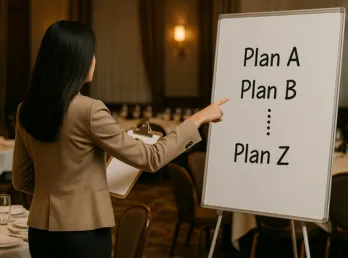“They needed someone to deliver it in Spanish... and after I did, the leadership team said, ‘You seem really comfortable up there.’”
Zaylan: So, where’s home for you?
Maricela: Long Beach, California.
Zaylan: And what’s your favorite food and drink?
Maricela: Mexican food. And to drink—water.
Zaylan: Water?
Maricela: Yep. Besides alcohol, that’s pretty much all I drink.
Zaylan: There you go. What’s your favorite hotel you’ve stayed at—or just your favorite place you’ve been?
Maricela: Probably the JW Masai Mara Lodge in Africa. We opened it last year.
Zaylan: Where in Africa is that?
Maricela: About four hours from Nairobi, in the Masai Mara Reserve. It’s a safari lodge.
Zaylan: Sounds amazing. What about a dream destination—somewhere you haven’t been yet?
Maricela: Japan. I’ve always wanted to go.
Zaylan: Any plans coming up?
Maricela: Not yet. But I know it’ll happen at some point. One of the perks of our job is we get to travel to some wild, fun places—so I’ve already crossed off a bunch. I’m not sure if work will take me to Japan, but I just need to carve out the time.
Gaby: Let’s talk about your early influences and career path. What was your first hospitality-related job?
Maricela: I was a cashier at a small, family-owned Italian restaurant in Long Beach when I was in high school. Not my family’s—just a local spot.
Gaby: Do you remember the moment you thought, “I could actually build a career in this industry?”
Maricela: I received my Bachelor of Science in Dietetics and Food Administration with a concentration in Food Service and Hotel Management, so I knew I liked it—but it really clicked during one of my intro classes. We took a field trip to a nearby Marriott where two people gave a talk about all the positives of hospitality—of course, they left out the part about giving up your holidays!
But I remember thinking, “This is fun.” I didn’t know where it would take me, but that’s when I applied for my first hotel job—back in 2007.
Gaby: What made you choose to study dietetic and food service administration?
Maricela: I actually started as a business major—it just sounded fun. But I met someone in a program who said their major was hospitality and food service, and I thought, “Hotel and restaurant stuff? That sounds fun.” I loved the idea of travel—though, honestly, I hadn’t done much of it yet. So I switched majors, and it took off from there.
Gaby: You started at Marriott and got into food and beverage training across hotel properties. Was there an early moment where you thought, “This is what I’m built for?”
Maricela: Funny enough, my first job at Marriott was not in food and beverage. My first role was at the front desk of a Courtyard in Long Beach, California. But it wasn’t a typical Courtyard—it ran more like a full-service hotel. Bigger than you’d expect for the brand.
I was there a few years, then moved into a sales admin role to learn that side of things. From there, I went into HR at a hotel near LAX. I was only in that HR admin role for a few months when a training opportunity came up. It was for onboarding, culture, and service development—all under the HR umbrella.
There was a new program rolling out across the hotel, and they needed someone to deliver it in Spanish. Since I spoke Spanish and was already in HR, they asked me to lead the sessions for our Spanish-speaking team members.
After I facilitated the training, the GM and a few leaders came up and said, “Wow, you looked really comfortable up there. Did you enjoy that?” And I said, “Yeah, it wasn’t as bad as I thought it would be.”
Not long after, a training and development manager role opened for that area within the company. I started overseeing training across six hotels in L.A., and that’s when I realized, “Okay, I think I’m decent at this.” I’m never going to say I’m the best—I don’t believe in that—but I felt comfortable doing it. And that was a good feeling.
Gaby: That’s quite an interesting journey!
“It’s really hard to teach someone how to give great service if they’ve never experienced it themselves.”
Zaylan: Now a few questions around consulting strategy and leadership.
You’ve developed and implemented a lot of different food and beverage programs across all kinds of environments. When you're stepping into a new project—whether it's an opening or a rebrand—what's the first thing you look for to understand what success will look like there?
Maricela: First, I always look at what they’ve already built. I want to understand what’s working for them and grow from there. I try to listen—to really understand their outlet, their hotel, their team—because every space is unique.
Some restaurants don’t have hosts greeting guests. Some rely on bartenders to play multiple roles—welcomer, server, bartender. So I go in expecting the unexpected. It might sound odd, but I try not to go in with a rigid plan, because it’s going to change anyway.
When I started, I felt like I had to have a plan—that’s just my personality. But over the years, I’ve learned that you can only prepare so much. Every property and every team is different. Now it’s more about listening, being present, and showing the team we’re here to support—not take over.
We look at what’s been implemented, work through it together, and I’ll play devil’s advocate. Like, “Yeah, we said this—but what if that happens? Let’s make a Plan B.” It’s always a collaborative process.
Zaylan: And when you're training so many different teams on service standards, how do you help them keep things personal and human—not just checking the box? Especially once the hotel opens and they’re live?
Maricela: I think it starts by making them feel it first. It’s really hard to teach someone how to give great service if they’ve never experienced it themselves.
During training, I make a point to use their names, look them in the eye—really make them feel seen and heard. If they feel that from me, then they know how it should feel, and that helps them deliver it to guests. It’s all about showing, not just telling.
Zaylan: What are some of your go-to strategies for making sure everything’s ready to go on day one—especially with the timing of an opening?
Maricela: Not sleeping! [laughs]
That—and making sure the team is equipped with as many resources as possible, based on their specific situation.
Also, understanding that not everything is going to be perfect on day one. That’s probably the biggest thing—helping the team understand that too. It’s about controlling what you can, and for everything else, staying proactive. But if we do have to react, then we make sure we respond in the best way possible.
Zaylan: Right. So on that note, openings can obviously be unpredictable. In a project where things don’t go according to plan, how do you help the team adapt in real time?
Maricela: By figuring out Plan B, C, D—all the way to Z if we have to.
The hotel staff and leadership team have usually been on site for months before we show up, working crazy hours. So I think the biggest thing is being their cheerleader—not adding more negativity.
Instead of saying, “Yeah, that sucks. Now what?” it’s more like, “Okay, that’s okay. Let’s look at other options.” I’ll even share examples from other hotels: “We tried this at another opening—maybe it could work here?” And if not, we pivot again.
But always with encouragement and support—not just pointing out what’s going wrong.
Gaby: So, what made you decide to join EAG and move into the consulting side of the industry?
Maricela: At the time, I’d been with Marriott for nine years. It was my comfort blanket.
I was introduced to EAG while I was on the Marriott openings team.
I’d reached a point in my career where I was ready for a new role, a different division. I applied for one, but didn’t get it because—quote—“I lacked beverage knowledge or brand knowledge” for that specific brand.
That brand was actually new to the company. My leadership recommended I work with Chris and EAG—since we were already partnering on some projects—to build up the beverage experience I needed.
So I started working more with EAG, especially on openings that weren’t technically Marriott-related—more EAG-led concepts. And I didn’t just observe—I jumped in wherever I saw a need. If something needed to get done, I went for it.
Building that relationship with EAG, and seeing how I could make an impact, made me realize this was something I wanted to be part of.
It definitely took a few months of convincing—mostly convincing myself—because it’s hard to leave a company you’ve been with for so long. I’m very old-school that way—very loyal. But I saw so much opportunity at EAG to create change and make a bigger impact.
What helped ease the transition was that I was still working with Marriott in some capacity—just not for Marriott anymore.
Gaby: And at EAG, what services are you involved in, and what kind of clients are you working with?
Maricela: I oversee the operations side—specifically the consulting side. My bread and butter is training. That’s my background: hotel openings, any kind of training-related initiative. That’s what I lead.
I don’t know if I fully answered the question—but I hope that makes sense.
“I want people to walk away feeling like they felt something—something personal and meaningful.”
Gaby: Yes it does! What are your favourite types of projects to work on?
Maricela: Good question. I’d say the ones that take me to fun locations!
I really enjoy openings—especially hotel openings. I’m actually a little sad I don’t do as many in the U.S. anymore like I used to. I loved visiting smaller cities and learning about the culture and mindset of the people there. Even within the U.S., the vibe can be completely different from the big metropolitan city I grew up in.
I also love meeting new people and sharing in their excitement—like when they’re opening a hotel and starting a new chapter in their lives with this new job. That part of the work will always be special to me, even if I don’t get to do it as often anymore.
Gaby: Nice. And you’ve worked with countless F&B outlets. What’s your advice to a manager who wants to help their outlet stand out?
Maricela: I think it all comes down to leadership—and understanding there’s a big difference between being a manager and being a leader.
If you want to stand out, you have to build trust with your team. They need to believe in you. That’s the only way they’ll really show up and execute for you. Be their leader, not just someone who manages tasks.
Gaby: Great advice.
Zaylan: What’s one of the hardest leadership lessons you’ve had to learn—and how did it shift the way you show up today?
Maricela: Communication. That’s probably the biggest one—not just in my career, but in life.
Don’t hold things back, and don’t be afraid of hurting people’s feelings if what you're saying comes from a good place. Honest communication matters.
Zaylan: And how do you keep teams motivated during the messy middle of a project—when the excitement of the beginning has worn off but the finish line isn’t quite in sight?
Maricela: Pause.
Not necessarily a full break, but something small—a reset. Maybe going outside to change the scenery for a few minutes before diving back in. Just something to help you refocus and come back with fresh energy.
Zaylan: And since you’re in so many different training environments and working with so many personalities, how do you adapt your leadership style without losing what makes you?
Maricela: Every person reacts differently.
One thing I think I’m good at is reading people—figuring out how to respond in a way that works for them and lets them receive the message the way I actually intended. So I adjust my communication style depending on the person, without changing who I am at my core.
Zaylan: Awesome. How do you know when to lean in and coach versus when to step back and let someone find their own rhythm?
Maricela: Depends on the situation.
If it’s something serious—a red flag that could impact the business—then I coach immediately. If it’s something more minor or personality-based, I might step back and let them figure it out. Sometimes the best learning happens through experience, and they just need time to improve.
Zaylan: When it comes to the teams you’ve worked with, what are you most proud of? Not in terms of what they achieved, but how they grew. Do you see a lot of personal growth during the opening process?
Maricela: Yes—absolutely.
Even though we’re only there for about 10 days, you still get to witness some incredible moments.
Those are the moments I’m proud of. Like someone who’s never made a cocktail before, and by the end of training, they’ve memorized the recipe and are making it confidently during mock service. You can see the pride on their face—and that just makes me happy.
Gaby: Let’s cover a few questions on concept development and trends. You’re pretty hands-on with developing new food and beverage concepts for EAG projects, right?
Maricela: I’m actually not. We can skip that part—I don't really consider myself the creative one. I’m the executor. I’m the operator.
When people start talking about design concepts or visuals, I always say, “That’s not how my brain works.”
If someone asked me to decorate a room, it would probably look terrible. But if they said, “We need to implement a new process,” I’ll figure out the best way to make it happen. That’s where my brain goes—structure and execution, not aesthetics.
Gaby: Got it. I totally hear you—I’m the same way!
So if you could dream up your own concept from scratch—totally blank slate—what kind of hospitality experience would you want to create?
Maricela: I’d want to create an experience where every guest feels an emotional connection.
Something that either creates a brand new memory for them or taps into one they already have. I want people to walk away feeling like they felt something—something personal and meaningful.
“I hope they feel like I was there for them—that I had their best interests at heart.”
Zaylan: Alright, last couple of questions.
When someone looks back on working with you—whether during an opening or a consulting engagement—what do you hope they take away from the experience?
Maricela: I hope they feel like I was there for them—that I had their best interests at heart.
That I showed up to support them, make their lives easier, and help them grow.
Zaylan: What’s one piece of leadership advice you come back to again and again?
Maricela: Probably communication—again.
Doing it immediately, doing it effectively, and setting clear expectations. That helps avoid frustration later when things don’t happen the way you thought they would.
Zaylan: And what excites you most about the future of the hospitality industry?
Maricela: I love the shift we started seeing—especially after COVID—toward focusing on experience over product.
Luxury wasn’t just about money anymore. It became more about thoughtful, human connection.
That excites me. I love going to places where service isn’t just transactional—where a bartender or server is actually engaging, building trust, creating real moments. That’s the kind of hospitality that inspires me.
Zaylan: And last one—what advice would you give to a young professional just starting out in hospitality? Especially a young woman who wants to lead at the executive level someday?
Maricela: Be patient—and be okay with not knowing everything. Just keep learning, and take risks.
I think, as women, we often wait until we feel completely ready before going after something. Meanwhile, I’ve seen a lot of men take on roles they’ve never done before and figure it out along the way.
We need to do more of that—just jump in and learn as we go.
I’ve passed on opportunities in the past because I was scared of failing. I wasn’t “ready.” Someone once offered me a director role overseeing rooms—housekeeping and all that—and I turned it down because I didn’t have experience. Now, I’m glad I didn’t take it because my path brought me here. But I would’ve learned a lot.
So yeah—sometimes you’ve just gotta say, “F**k it,” and go for it. [laughs]
Gaby: OK maybe that’s the quote for the interview!
Maricela: [laughs] That’s the quote of my life.
Gaby: I love that last piece of advice. It’s so true. As women, we wait. We think we need more training, more experience. That was really powerful.
Maricela: Yeah. That’s definitely been my experience. But I always say—everything happens for a reason.
If I don’t get a job I went for, or something doesn’t work out, it’s because I’m meant to take a different path. That’s how I frame it, so I don’t stay stuck in disappointment.




















